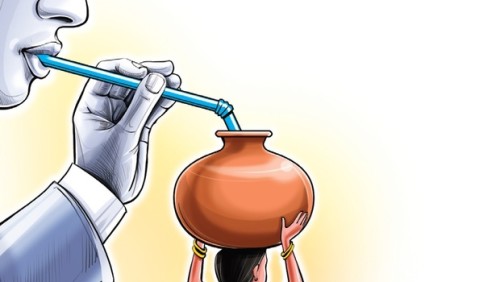April is the cruellest month. The ever-soaring mercury level has dried up many a well. The temperature in Malampuzha rose to unprecedented heights to touch 41.9 degrees, the highest in the state since 1987. People run behind tanker lorries to collect water. In fact, misery is this summer’s theme. For the commoners, that is. The corporates, including a soft drink major and a brewery unit, exist in a parallel universe.
 At a time when villagers crave for a drop of water, they merrily guzzle underground water depleting the water table. Several firms like Pepsico, United Breweries, Amrut Distilleries, United Spirits and Empee Distilleries, which dot the Kanjikode landscape, consume lakhs of litres of water everyday. Thomas Scaria, district officer of the Groundwater Department, who shared the data collected by the department in the wake of a High Court direction asking Pepsi to pump out only 6 lakh litres per day, said the corporate major used the second, sixth and seventh tube wells.
At a time when villagers crave for a drop of water, they merrily guzzle underground water depleting the water table. Several firms like Pepsico, United Breweries, Amrut Distilleries, United Spirits and Empee Distilleries, which dot the Kanjikode landscape, consume lakhs of litres of water everyday. Thomas Scaria, district officer of the Groundwater Department, who shared the data collected by the department in the wake of a High Court direction asking Pepsi to pump out only 6 lakh litres per day, said the corporate major used the second, sixth and seventh tube wells.
As per the Scada (Supervisory Control and Data Acquisition) reading recommended by the HC and the Assembly Subjects Committee, Pepsi pumped out 5.76 lakh litres per day in January, 5.25 lakh litres per day in February and 5.97 lakh litres per day in March. ‘’The Kerala HC had in 2007 annulled an order of the panchayat cancelling the licence of the bottling unit in Kanjikode as it was using potable water sources. The court held that the panchayat did not have the powers to issue or cancel licences to industries in special industrial areas as they have been excluded from the Panchayat Raj Act,’’ Pudussery panchayat president Unnikrishnan said.
Focused on Increasing Water Credit: Pepsi
In response to a query by Express, Pepsico said they continue to honour the guidelines of Kerala High Court. “Pepsi simultaneously works on two fronts – first, by reducing our water debit, that is, the amount of water used within our operations and second by increasing our water credit – that is the amount we gave back by recharging and replenishing water through sustainable initiatives in agriculture, within communities and in our plants,” said Pepsico India spokesperson.
However, the court observed that the panchayat’s concern about water shortage should not be ignored as right to life under Article 21 of the Constitution implies the right to food and water. In the wake of the HC verdict, the state government had constituted an expert committee to study the impact of groundwater extraction in and around Pepsi’s unit.
The team comprised the director of the Ground Water Department, regional director of the Central Ground Water Board, director of the CWRDM, Kozhikode, John Kurian, retired chief general manager of Nabard, member secretary of the Pollution Control Board and a member from the Kariavattom University. The committee recommended that Pepsi’s ground water utilisation should be restricted to 2.34 lakh litres per day. The government submitted the report to the High Court in a review petition.
What’s worse, the Malampuzha reservoir which supplies potable water to Palakkad municipality and six panchayats is fast drying up. Strangely, that does not stop supply of water to the brewery units. “The KWA supplies 15,000 to 17,000 kilo litres of water per month from the Malampuzha dam under industrial category to United Breweries which brings in a revenue of `7 lakh per month,” said executive engineer Prakashan. “There is serious potable water shortage in Attappalam, P K Challa, Chullimada, Walayar, Vadakarapathy, Chembna and Kava near Kanjikode. These places rely on tanker lorries for water. There are seven tube wells with 12 inch radius in the Pepsi unit. Currently, the 6th and 7th tube wells, deepest among the lot, are being used,” said Jana Jagratha general secretary P S Panicker.
He said though former Water Resources Minister N K Premachandran had suggested supply of water from the Malampuzha dam under the category of industrial purposes, it was rejected by Pepsi.
“The meters of the tube wells should be sealed as there is chance of manipulation. Each time the seal is opened to take the reading, the elected representatives should be present. Otherwise, such exploitation will result in the land turning into a desert and may even cause earthquakes.”

